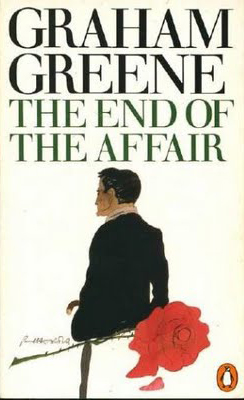Books |
Graham Greene: The End of the Affair
By
Published: Oct 19, 2022
Category:
Fiction
Graham Greene was one of the masters of 20th century fiction, and “The End of the Affair” is one of his best novels. Almost everyone I know who has read it — or seen the movie with Ralph Fiennes and Julianne Moore — has found it unforgettable. As a psychological portrait of an affair. As an exploration of Greene’ untraditional brand of Catholicism. And as a clever plot: Sarah’s cheating on her husband, and her lover is convinced she’s also cheating on him. [To buy the paperback from Amazon, click here. For the Kindle edition, click here.]
Let’s meet the players.
The narrator is Maurice Bendrix, known mostly by his last name. In the London literary scene just before World War II, he’s an up-and-coming novelist, with twitches that are often the lot of novelists: a high sex drive and low self-esteem. As he writes, “It’s a strange thing to discover and to believe that you are loved when you know that there is nothing in you for anybody but a parent or a God to love.” And his view of sex spells trouble for any lover: “I have always found it hard to feel sexual desire without some sense of superiority, mental or physical.”
Bendrix has a character in his new novel who is a civil servant. This sends him away from his desk for some research. He meets Henry Miles, who’s just boring enough for his book, and Henry’s wife Sarah. He notices her because she seems happy, because she says she’s read his books without going on to gush about them, and because she’s far too beautiful for Henry. They begin an affair. “I have never, never loved a man as I love you,” she tells him, “and I never shall again.”
Can Bendrix be content with so much love? At the start of the war, he can. Ironic, he notes: the war brought him peace. But he knows just how to ruin everything:
“I became aware that our love was doomed; love had turned into a love affair with a beginning and an end. I could name the very moment when it had begun, and one day I knew I should be able to name the final hour. When she left the house I couldn’t settle to work. I would reconstruct what we had said to each other; I would fan myself into anger or remorse. And all the time I knew I was forcing the pace. I was pushing, pushing the only thing I loved out of my life. As long as I could make believe that love lasted I was happy; I think I was even good to live with, and so love did last. But if love had to die, I wanted it to die quickly. It was as though our love were a small creature caught in a trap and bleeding to death; I had to shut my eyes and wring its neck.”
For an interior book, “The End of the Affair” has a major event: the German bombing of London. In 1944, Bendrix and Sarah are in bed together when the bomb hits his building. He dresses quickly, hurries out of the room to help, and, when a second bomb hits, is trapped under a door. Sarah sees his arm, not moving. And although she hasn’t been a believer, she makes a deal with God: Spare my lover, and I’ll give him up.
For Bendrix, it’s not a good deal. It leads to longing, bad behavior, private detectives, hideous treatment of Sarah’s husband, and the kind of torment that can only be called spiritual.
It’s also a bad deal for Sarah:
“I’m not at peace anymore. I just want him like I used to in the old days. I want to be eating sandwiches with him. I want to be drinking with him in a bar. I’m tired and I don’t want any more pain. I want Maurice. I want ordinary corrupt human love. Dear God, you know I want to want Your pain, but I don’t want it now. Take it away for a while and give it to me another time.”
Why does Sarah honor the deal? What happens after love ends? And when it does, where does love go? Two of these three questions may be familiar to you. The spiritual component of romance — maybe that too.
Because the narrator is a writer, you may wonder if Bendrix is a stand-in for Greene. Glad you asked. The book is dedicated “to Catherine, with love.” This was Catherine Crompton, who became Greene’s mistress in 1946. She was married. And Greene was her godfather. Did the dedication of this book to her in 1951 cause a scandal? In America, it would have. In England? The publication caused Catherine’s husband to demand that she end the affair. She did — 15 years later.
The film brilliantly captures the book, the war and a remarkable affair. [To stream the movie from Amazon Prime, click here].


